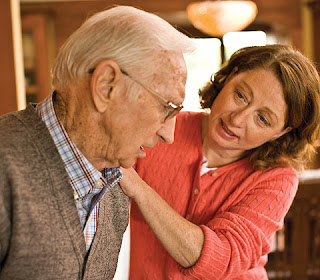 |
Progress Senior Care Manager Patrick Ridner has a personal connection to caring for seniors.Progress Asks: What's the Top 3 Things In-Home Care Provides?
It's Tuesday, so once again Progress is giving you a peak into the world of senior care with our Progress Asks segment. Today, our guest blogger Progress Senior Care Manager Patrick Ridner will provide a list of some of the major aspects of in-home care through the services Progress Inc. provides.
Patrick has a heart for the communities we serve. The Middle Tennessee native said his grandfather's passing more than a year ago, opened his eyes to the need for care at home.
"My grandfather passed away two days before I got the job here," Patrick said. "He had been in a nursing home, but if we would have known about something like Progress, he could have been cared for at home. It seems like people know they're there to die at a nursing home."
Working at Progress means he can give families an opportunity his family didn't have. He enjoys interacting with his employees that work in the homes and getting to know the people Progress supports. It's hard to know exactly when someone could utilize in-home care, but Patrick has one piece of advice
"When a person loses a certain amount of independence, (like they need help with cooking or cleaning), our services are beneficial. That's when we can come in and make the difference."With in-home care, caregivers can provide a personal touch and add much more to the lives of the people they support, Patrick said.Here's the TOP 3 Thing Patrick suggests in-home care can provide:COMPANIONSHIP: The interaction between our senior care attendants and the seniors is often the best benefit for them. We have one person that goes to her church with her senior care attendant. Another loves to go to yard sales with her caregiver. It's all about having someone there rather than being alone for the time their family can't be there.TRANSPORTATION: Many of our folks need to make it to doctor's appointments, grocery stores and other places, but they don't drive anymore. We get them there and wait with them as long as they need us.CARING FOR HOME: Sometimes it's difficult for seniors to make meals, do laundry and clean their homes like they once did. Our senior care attendants provide light housekeeping, prepare meals, prepare grocery lists and handle other domestic duties for the people we support.Let us know what you think about Patrick's blog in the comment section below: |
Chronicling the highlights and relevant news of the disability rights movement, senior care community and staff and clients at Progress Inc., a Nashville-based non-profit that bridges the gap between limited abilities and the realization of the best possible life for adults with disabilities and seniors.
Tuesday, July 30, 2013
Progress Asks: Top 3 Things In-Home Care Provides
Tuesday, July 23, 2013
Progress Asks: Is your Elderly Loved One Depressed?
 |
| Depression in the elderly community often goes unnoticed. - Courtesy of www.caregiverstress.com . |
Progress Asks: Is your Elderly Loved One Depressed?
When caring for an elderly parent or sibling, ensuring their basic needs are met is quite challenging. However, along with caring for the practical needs - feeding, clothing and personal hygiene - the emotional needs of your loved one are also important. In today's Progress Asks' segment, we look at some of the warning signs that could greatly affect the emotional and mental health of your spouse, parent or other loved one.
According to the NIH, some of the changes and life events you may notice are:
- Adapting to a move from home to an apartment or retirement facility
- Chronic pain
- Feelings of isolation or loneliness as children move away and their spouse and close friends die
- Loss of independence (problems getting around, caring for themselves, or driving)
- Multiple illnesses
- Struggles with memory loss and problems thinking clearly
Look for the signs that an older loved one may be depressed and need help:
- Being more confused or forgetful.
- Eating less. The refrigerator may be empty or contain spoiled food.
- Not bathing or shaving as often. Visitors may notice smells of urine or stool. Clothes may be dirty and wrinkled.
- Not taking care of the home.
- Stopping medicines or not taking them correctly.
- Withdrawing from others. Not talking as much, and not answering the phone or returning phone calls.
Source:
http://www.caregiverstress.com/illnesses-conditions/senior-depression/signs-of-depression-checklist/
Thursday, July 18, 2013
Camp Progress: Moments & Milestones from Summer Camp
A great summer with some amazing kids came to an end last week!
Take a peak at how Ian, Randall and the other kids shared moments and milestones at Camp Progress.
We also had great support from the folks at West End Middle, SugarCreek Carriages, Kroger in Belle Meade, Moe's in Belle Meade and, of course, our wonderful volunteers like Blaine from Centennial Sportsplex, Chris and Terri who all added the much needed viable activities and programs for our young people. We also thank our fearless Progress team led by Lanitta Joseph.
Want to make sure your child with an intellectual disability has a super summer next year?
Contact Meika McClendon at m.mcclendon@progress-inc.org for details on Camp Progress 2014.
Wednesday, July 10, 2013
Subscribe to Progress Inc.'s Mailing List !
| ||||||||||||||
| ||||||||||||||
| ||||||||||||||
Tuesday, July 9, 2013
Progress Asks: What FREE Resources Are There for Senior Caregivers?
Progress Asks returns to pose a question that many caregivers probably don't think about day to day, but is important to know:
Q: What free resources are there for senior caregivers?
A:There are several resources online, such as caring.com and caregivingcafe.com that give useful tips and other resources about staying healthy, being mindful of elderly care and providing the best care to whomever you support.
However, for those searching for face to face-to-face opportunities. The upcoming "So your loved one has Alzheimer's...A Journey for Caregiver's," which will be held July 23 at Trevecca Community Church, is the perfect opportunity to interface with Nashville's senior caregiving community and other elder care experts. The best part of the seminar - It's FREE! Register here for this open seminar for caregiver's brought you by the Mental Health America of Middle Tennessee.
Join Us Tuesday, July 23!
|
Mental Health America of Middle Tennessee presents the "So your loved one has
Alzheimer's...A Journey for Caregivers" conference
on Tuesday, July 23 from 9:30 a.m. to 2:30 p.m. at Trevecca Community Church
in Nashville. This seminar is FREE
to all caregivers and lunch is provided at no cost. Respite care is also
available at no cost.
Click here to print
a brochure.
|
Agenda: |
9:30-10 a.m.
Registration
10-10:10
Opening Address
(Diane Gramann, LAPSW, ACSW)
10:10-10:30
Caregiver Perspective
(Genma Holmes)
10:30-11:30
Understanding Stages and
Challenges
(Mary Harkleroad, LCSW)
11:30-12:30
Lunch
12:30-1:00
Alzheimer's, Dementia and
Caregiving
(Video of Dr. William Petrie)
1:00-1:45
Panel Discussion:
Staying at Home Safety
(Christy Horner)
1:45-2:30 If Home is
no longer an option....
(Maribeth Farringer,
Diane Gramann, LAPSW, ACSW)
|
Presented by:

For more information,
visit us online at www.mhamt.org
|
Tuesday, July 2, 2013
Progress Asks: What Makes Your Caregiver Right For YOU?
Progress is starting a new Progress Asks series. Every Tuesday, we'll ask a question that Progress and other fellow senior care experts have answers for.
From our friends at Care In the Home www.careinthehome.com:
To remain active and independent in your own home
It sounds simple, but as our bodies age it can become a very difficult task. The best approach to finding a good caregiver is to focus on two separate goals:
1) Satisfying the basic needs.
The skills of the caregiver must match the needs of the client at all times. Suppose a client needs help in the morning with bathing, grooming, toileting, dressing, taking medications, making breakfast and some light cleaning and laundry. The first priority is to insure that the client receives these physical services in a safe, efficient, professional and dependable manner. Often referred to as Activities of Daily Living (ADL), this is the physical work that allows a client to remain indepent in their own home. At Care in the Home, our clinical case manager performs a full needs assessment before services begin and keeps a detailed care plan updated throughout the course of service.
The skills of the caregiver must match the needs of the client at all times. Suppose a client needs help in the morning with bathing, grooming, toileting, dressing, taking medications, making breakfast and some light cleaning and laundry. The first priority is to insure that the client receives these physical services in a safe, efficient, professional and dependable manner. Often referred to as Activities of Daily Living (ADL), this is the physical work that allows a client to remain indepent in their own home. At Care in the Home, our clinical case manager performs a full needs assessment before services begin and keeps a detailed care plan updated throughout the course of service.
2) Finding the personality fit.
Once the basic physical needs met, the fine tuning comes in finding a caregiver that "clicks" with the client. Meeting with the client and family before service begins helps our case manager get a sense of what personality traits in a caregiver would best fit with the personality of the client. When a client and caregiver click, it is wonderful but it can take some trial and error before that fit is achieved and it may never be as perfect as we would like. Much depends on timing and what caregivers are available when a client is searching. Having patience and keeping an eye always on the primary goal of independence in the home is essential in this part of the process.
Once the basic physical needs met, the fine tuning comes in finding a caregiver that "clicks" with the client. Meeting with the client and family before service begins helps our case manager get a sense of what personality traits in a caregiver would best fit with the personality of the client. When a client and caregiver click, it is wonderful but it can take some trial and error before that fit is achieved and it may never be as perfect as we would like. Much depends on timing and what caregivers are available when a client is searching. Having patience and keeping an eye always on the primary goal of independence in the home is essential in this part of the process.
In addition, it is important to realize that a search for a caregiver is actually a search for a teamof caregivers because caregivers get sick, need vacation and must live their own complex and challenging lives like anyone else. Experiencing good service from two, three or more caregivers can develop a trust for the team of caregivers that a company employs. A client can then feel confident that any replacement sent will be competent and wonderful in their own way. That might actually be the best kind of perfect.
Subscribe to:
Comments (Atom)










